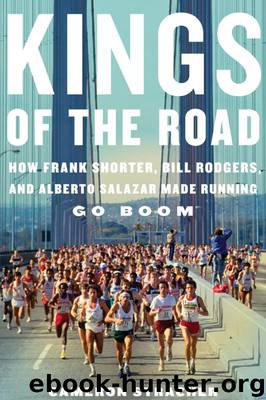Kings of the Road by Cameron Stracher

Author:Cameron Stracher
Language: eng
Format: epub
Publisher: Houghton Mifflin Harcourt
9
Cheaters Prosper (1976)
Frank Shorter shaking hands with Waldemar Cierpinski after the 1976 Olympic marathon. Associated Press
What Frank and Abebe [Bikila] did, they did without drugs.
—BILL RODGERS
AS LONG AS THERE has been sport, there has been cheating.
In the ancient Olympics, competitors ate exotic meats that supposedly gave them strength. Before chromosome testing, the Greeks competed naked to prevent women from pretending to be men. In 1807, Abraham Wood claimed that he used laudanum to stay awake for twenty-four hours while racewalking against the great Captain Barclay. In the 1904 Olympic marathon, the American Thomas J. Hicks downed several doses of strychnine and egg whites, followed by a large glass of brandy, given to him by his “trainer,” Charles Lucas. Although he finished second, he was declared the winner when it was discovered that the first-place finisher, Fred Lorz, had been driven in a car for at least three miles. The race had been run in 90-degree heat on a road that was so dusty one runner suffered a near-fatal hemorrhage from breathing difficulties. It didn’t help that twenty automobiles kept pace with the runners, kicking up rocks and dirt the entire way. When Hicks begged for water during the race, Lucas refused, giving him a sponge bath with water warmed by the car’s radiator instead. Afterward, Lucas bragged that “the marathon race, from a medical standpoint, demonstrated that drugs are of much benefit to athletes along the road.”
But it was at the 1976 Olympics where rampant drug use became official state policy. Even before the games began, twenty-three U.S. athletes failed drug tests at the trials (although none were punished). Rumors swirled that Lasse Virén, who had completed the “double-double” in the 5000 and 10,000 meters, was blood doping, a process in which blood is withdrawn from the body and then hemoglobin is reinfused shortly before competition. The theory—since proven effective by cyclists in the Tour de France, who have accomplished the same thing with the drug EPO (erythropoietin)—is that more hemoglobin allows the body to work harder by bringing more oxygen to the muscles. Virén had run four races in eight days and announced he would run his first marathon the day after winning the 5000 meters, in an effort to equal the “triple” of Emil Zátopek in 1952. Although Virén has denied the allegations, many observers believed his attempt was possible only with the assistance of a biological boost.
Frank Shorter, however, was not worried about Virén. Indeed, he thought there was no one who could beat him if he stayed healthy and ran his race. He had lost both his number one ranking and his U.S. record to Bill Rodgers, but only because he had mostly abstained from longer races for a year. The Montreal Olympics was his chance to match the great Abebe Bikila’s two gold medals in the marathon, and he knew history would judge him by this race. He quit his job to concentrate on training, while his wife, Louise, supported them because his running provided almost no income.
Download
This site does not store any files on its server. We only index and link to content provided by other sites. Please contact the content providers to delete copyright contents if any and email us, we'll remove relevant links or contents immediately.
Imperfect by Sanjay Manjrekar(5682)
Wiseguy by Nicholas Pileggi(5324)
The Body: A Guide for Occupants by Bill Bryson(4590)
Tuesdays with Morrie by Mitch Albom(4411)
Unstoppable by Maria Sharapova(3409)
Crazy Is My Superpower by A.J. Mendez Brooks(3208)
Not a Diet Book by James Smith(3156)
Into Thin Air by Jon Krakauer(3132)
The Mamba Mentality by Kobe Bryant(3101)
The Fight by Norman Mailer(2709)
Finding Gobi by Dion Leonard(2637)
Tuesdays With Morrie by Mitch Albom(2578)
The Ogre by Doug Scott(2506)
My Turn by Johan Cruyff(2497)
Unstoppable: My Life So Far by Maria Sharapova(2388)
Accepted by Pat Patterson(2219)
Everest the Cruel Way by Joe Tasker(2135)
Borders by unknow(2120)
Open Book by Jessica Simpson(2114)
